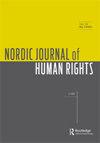人权就足够了吗?探索重塑人权法的途径
IF 1.2
Q3 POLITICAL SCIENCE
引用次数: 0
摘要
国际人权体系面临着一系列问题的批评,包括其标准含糊不清,执行机制薄弱,因而缺乏对实地的影响,以及普遍性的概念与文化特殊性不相容。本文分析了其中的一些学术批评,并认为它们应该被视为一个警钟。它讨论并探讨了重新构想现有人权框架的可行方法。这里的重新构想并不意味着重新制定现有框架;这意味着重新审视当前体系所依据的假设。这篇文章并不认为人权的理念和理想已经走到了尽头,就像一些批评者所说的那样。相反,它认为人权语言仍然具有高度相关性,这一点可以从知识分子和实践者(包括人权维护者和民间社会组织)越来越多地使用人权语言看出。因此,讨论的重点应从批评转向吸取教训,并探索使人权与所有人息息相关的新途径。本文主要建立在二手资源的基础上,所讨论的批评仅限于学术批评。本文章由计算机程序翻译,如有差异,请以英文原文为准。
Are Human Rights Enough? Exploring Ways to Reimagining Human Rights Law
ABSTRACT The international human rights system faces criticisms regarding a range of issues, including ambiguity in its standards, weakness in its enforcement mechanisms and the resultant lack of impact on the ground, and the notion of universality being incompatible with cultural particularities. This article analyses some of these scholarly criticisms and argues that they should be seen as a wake-up call. It discusses and explores feasible ways of reimagining the existing human rights frameworks. Reimagining here does not mean reformulating existing frameworks; it means revisiting the assumptions on which the current system is based. The article does not agree that the idea and ideals of human rights are on their last legs, as some critics seem to suggest. It argues, instead, that the language of human rights is still highly relevant, as seen in its increasing use by both intellectuals and practitioners, including human rights defenders and civil society organisations. The focus of discourse should, therefore, shift from criticism to lesson-learning and exploring new ways to make human rights relevant to all. The article largely builds on secondary resources, and the criticisms discussed are limited to scholarly criticisms.
求助全文
通过发布文献求助,成功后即可免费获取论文全文。
去求助
来源期刊

Nordic Journal of Human Rights
POLITICAL SCIENCE-
CiteScore
1.00
自引率
25.00%
发文量
29
期刊介绍:
The Nordic Journal of Human Rights is the Nordic countries’ leading forum for analyses, debate and information about human rights. The Journal’s aim is to provide a cutting-edge forum for international academic critique and analysis in the field of human rights. The Journal takes a broad view of human rights, and wishes to publish high quality and cross-disciplinary analyses and comments on the past, current and future status of human rights for profound collective reflection. It was first issued in 1982 and is published by the Norwegian Centre for Human Rights at the University of Oslo in collaboration with Nordic research centres for human rights.
 求助内容:
求助内容: 应助结果提醒方式:
应助结果提醒方式:


